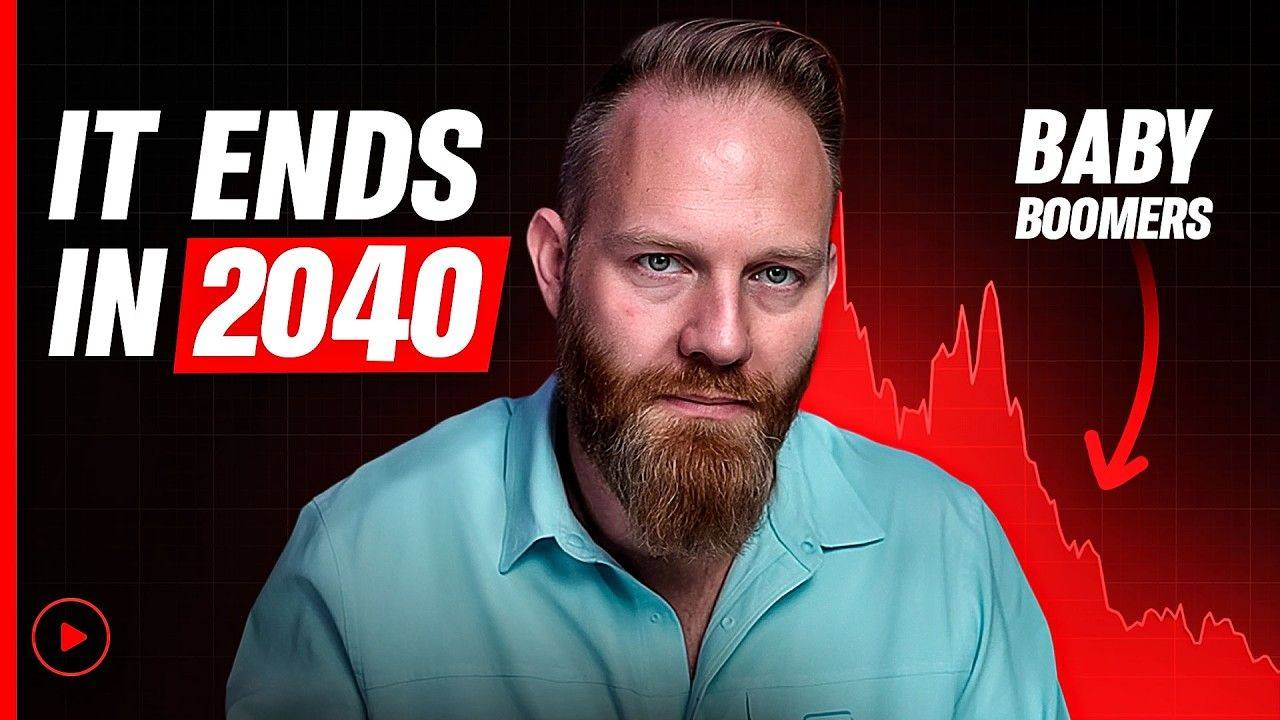The Coming Economic Shift: Why AI Could Trigger the Next Great Depression
Hey there,
Just a reminder - we are less than 1 month away from our 5th annual Self Storage Income LIVE 2025. If you are looking to get started in storage or take your existing portfolio to the next level I would love to see you there! Click here to learn more and register now.
Alright, let’s get to the newsletter. It’s a topic I’ve been excited about for the last few months. Throughout my two decades of investing, if there’s one thing I’ve learned, it’s this: the world rarely changes in ways we expect.
People look at the obvious headlines - rising interest rates, political drama, stock market swings - but what really shapes our future are the second-order consequences. The domino effects that no one is really paying attention to…until they hit like a freight train.
And today, that domino effect is being set into motion by artificial intelligence (AI).
Now, I’m not talking about a Terminator-style future or a world where nobody works. I’m not afraid of robots taking over humanity. I’m talking about something much bigger, more subtle, and in many ways, more dangerous. I believe AI could trigger an economic crisis larger than the Great Depression — not because AI itself is bad, but because of the ripple effects it will have on our already fragile economic system.
Let me break it down for you.
Why AI Is Underhyped (Yes, You Read That Right)
If you’ve been following mainstream commentary, you’ll hear plenty of hype around AI. But here’s my contrarian take: AI is actually underhyped.
Think back to when Paul Krugman, an American economist, famously said the internet’s impact would be no greater than the fax machine. That didn’t age well. The internet rewired every part of society - how we shop, how we bank, how we communicate, even how we date.
AI will do the same, except it will move faster and deeper. We won’t be able to live, work, or function without it. And here’s the kicker: it won’t take decades. It’s happening right now.
The Labor Crisis AI Will Solve… and Create
Here’s a fact most people don’t realize: 10,000 baby boomers are retiring every single day in the United States.
That’s millions of experienced workers leaving the labor force every year - and by the end of this decade, the shortage will exceed 10 million unfilled jobs. It’s not just a numbers problem; it’s a knowledge problem. You can’t replace 40 years of specialized expertise with a wave of new immigrants or young workers fresh out of school.
This is where AI steps in.
AI can absorb knowledge, perform repetitive or complex tasks, and fill gaps in industries like healthcare, law, finance, and education. It can keep storefronts open when labor shortages threaten to shut them down. It can help doctors see more patients with greater accuracy. It can help attorneys process information in hours instead of weeks.
Sounds great, right? Productivity goes up, costs go down, services improve.
But here’s the dark side: you can’t tax AI.
The Fiscal Cliff No One’s Talking About
Governments run on tax revenue. Income taxes, payroll taxes, business taxes - these are all tied to human labor. But what happens when millions of high-paying white-collar jobs are replaced by AI agents that don’t pay taxes?
You get a massive collapse in tax receipts.
We’re talking about hundreds of billions in lost revenue by 2030. Take a look at the impact predicted by each sector - our white collar jobs will be hit the hardest.
And this couldn’t come at a worse time because our government is already in a debt spiral:
-
It took the U.S. 220 years to rack up its first $1 trillion in debt.
-
In the last 20 years, we’ve ballooned past $30 trillion.
-
Annual interest payments are approaching $1.2 trillion - roughly 30% of all federal revenue.
To put that in perspective, our interest payments are already larger than defense spending (and remember, we spend more on defense than the next 10 countries combined). They’re set to rival or surpass Social Security and Medicare in the coming years.
And now add in collapsing tax revenues thanks to AI.
See the problem?
Why We Can’t Just “Tax the Rich”
You might be thinking: “Well, AJ, let’s just tax the billionaires more. They’re swimming in cash anyway.”
Here’s the sobering truth: even if we confiscated 100% of billionaire wealth — every yacht, every stock share, every mansion — it would only cover about one year of our federal deficit. And in doing so, we’d also crater the stock market, wipe out corporations, and kill future tax revenues.
It’s not a solution. We’re too far gone.
So where does that leave us? Higher taxes for everyone, shrinking government budgets, and a fiscal nightmare where debt compounds on itself because we can’t refinance at affordable interest rates.
The Self-Fulfilling Debt Spiral
Here’s the dangerous cycle we’re already caught in:
-
Government spends beyond its means.
-
Investors demand higher interest rates to buy U.S. bonds (because we’re a riskier bet).
-
Higher interest payments eat up more of the budget.
-
Tax revenues shrink (thanks to AI job displacement).
-
Government borrows more.
-
Repeat.
That’s how you get a self-fulfilling debt spiral.
Normally, economic growth offsets government debt - more jobs, higher incomes, more tax revenue. But if AI drives growth without human labor (and thus without taxable wages), then the usual escape hatch is sealed shut.
Why This Matters for You and Me as Investors
I don’t share this to scare you. I share it because as investors, we need to see reality as it is, not as we want it to be.
When I look at the next 5-10 years, here’s what I see:
-
AI will make the rich richer. Just like the internet, it’s leverage. The companies that control the most data will dominate entire industries. Wealth will concentrate at the top like never before.
-
White-collar disruption will hit harder than blue-collar. Unlike past automation waves (which mostly hit factory workers), AI is gunning for lawyers, doctors, coders, and analysts. That’s middle and upper-middle class income streams that fund government budgets.
-
Productivity will skyrocket…but so will inequality. Your healthcare might get cheaper, your legal bills might drop - but your neighbor may be out of work, and your taxes may rise.
-
The winners will own real assets. When inflation eats away at purchasing power and governments can’t print their way out, tangible, cash-flowing assets like real estate, self storage, and essential services become the ultimate hedge.
My Strategy: Fundamentals and Real Assets
I’m not making dramatic moves. I’m not selling everything and hiding under a rock. But I am doubling down on fundamentals:
✅ Businesses that provide essential services.
✅ Assets with real, inelastic demand (storage is a perfect example - people need space whether times are good or bad).
✅ Investments not predicated on wild growth multiples, but on real cash flow.
✅ A keen eye on AI adoption - investing in winners, hedging against losers.
The internet created trillion-dollar companies and destroyed industries in the same breath. AI will do the same, but faster. If you’re positioned well, you’ll be on the right side of that wealth transfer.
Final Thoughts
AI isn’t ChatGPT. It isn’t a fad. It’s a new operating system for the economy. And like any new OS (operating system), there will be bugs, crashes, and painful adjustments.
But there will also be opportunities of a lifetime.
My advice? Stay curious. Stay watchful. Don’t bury your head in the sand. The next five years will be turbulent, but they’ll also be the most exciting period of innovation we’ve seen since the dawn of the internet.
And I’ll be here with you, every step of the way, sharing what I’m seeing, how I’m investing, and where I’m finding stability in an unstable world.
If you want to hear more on this topic, watch my full Youtube video here.
Until next time,
AJ




